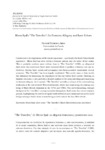Mostrar o rexistro simple do ítem
Meera Syal’s The Traveller: Its Feminist Allegory and Later Echoes
| dc.contributor.author | Pereira Ares, Noemí | |
| dc.date.accessioned | 2020-07-22T07:42:11Z | |
| dc.date.available | 2020-07-22T07:42:11Z | |
| dc.date.issued | 2020 | |
| dc.identifier.citation | Pereira Ares, Noemí (2020). Meera Syal’s “The Traveller”: Its Feminist Allegory and Later Echoes. Atlantis, vol. 42, n.1, pp. 1-19 | es_ES |
| dc.identifier.issn | 1989-6840 | |
| dc.identifier.uri | http://hdl.handle.net/2183/26045 | |
| dc.description.abstract | [Abstract] Committed to the exploration of the female experience—specifically the South Asian female experience—Meera Syal has often woven a feminist subtext into the fabric of her works. This is probably nowhere more evident than in “The Traveller” (1988), an allegorical short story that constitutes Syal’s more sustained effort to produce a feminist text per se. However, whereas Syal’s novels and screenplays have been accorded considerable critical attention, “The Traveller” has been largely overlooked. This article aims to help rectify this imbalance by reassessing the importance of this text within Syal’s oeuvre. Drawing on feminist discourse, it also provides a detailed analysis of the story, unveiling and examining its feminist allegory. As I contend, “The Traveller” provides a critique of the universalising tendencies at the core of much Western feminism, whilst also enunciating the coming into being of Black British feminism in the 1970s and 1980s. This notwithstanding, through the figure of the “traveller,” a strong metaphor throughout, Syal’s story also creates common ground, highlighting the need to recognise both differences and commonalities and to build bridges amongst South Asian women living at both ends of the East-West divide. | es_ES |
| dc.description.abstract | [Resumen] Comprometida con visibilizar la experiencia femenina y, más concretamente, la realidad de la mujer surasiática, Meera Syal es una escritora cuyas obras incluyen a menudo un subtexto feminista. Un claro ejemplo de esto lo encontramos en “The Traveller” (1988), un relato corto de carácter alegórico que incorpora una marcada agenda feminista. Sinembargo, podría decirse que, frente a otras obras de Syal, este relato ha sido ampliamente ignorado por la crítica literaria. El objetivo de este artículo es contribuir precisamente a rectificar este desequilibrio, reevaluando la importancia de este texto dentro de la obra de la autora. Apoyándose en trabajos críticos de corte feminista, el artículo también pretende proporcionar un análisis detallado del mencionado relato, revelando y examinando la alegoría feminista que encapsula. Como se expone a lo largo del artículo, “The Traveller” se erige como una crítica a las tendencias universalizadoras sobre las que se ha sostenido el feminismo occidental, al tiempo que enuncia la aparición del denominado feminismo negro británico en las décadas de 1970 y 1980. A pesar de esto, a través de sus densas metáforas, el relato de Syal también enfatiza la idea de comonalidad, destacando la necesidad de reconocer tanto las diferencias como los puntos en común, así como la pertinencia de establecer vínculos entre la experiencia femenina en el subcontinente indio y sus diásporas. | es_ES |
| dc.language.iso | eng | es_ES |
| dc.publisher | Spanish Association of Anglo-American Studies | es_ES |
| dc.relation.uri | https://doi.org/10.28914/Atlantis-2020-42.1.01 | es_ES |
| dc.rights | Atribución-NoComercial-CompartirIgual 4.0 Internacional | es_ES |
| dc.rights.uri | http://creativecommons.org/licenses/by-nc-sa/4.0/ | * |
| dc.subject | Syal, Meera | es_ES |
| dc.subject | Short story | es_ES |
| dc.subject | The Traveller | es_ES |
| dc.subject | Black British Feminism | es_ES |
| dc.subject | Sisterhood | es_ES |
| dc.subject | Relato corto | es_ES |
| dc.subject | Feminismo negro británico | es_ES |
| dc.subject | Solidaridad femenina | es_ES |
| dc.title | Meera Syal’s The Traveller: Its Feminist Allegory and Later Echoes | es_ES |
| dc.type | info:eu-repo/semantics/article | es_ES |
| dc.rights.access | info:eu-repo/semantics/openAccess | es_ES |
| UDC.journalTitle | Atlantis: Journal of the Spanish Association of Anglo-American Studies | es_ES |
| UDC.volume | 42 | es_ES |
| UDC.issue | 1 | es_ES |
| UDC.startPage | 1 | es_ES |
| UDC.endPage | 19 | es_ES |
Ficheiros no ítem
Este ítem aparece na(s) seguinte(s) colección(s)
-
GI-EI-Artigos [9]






